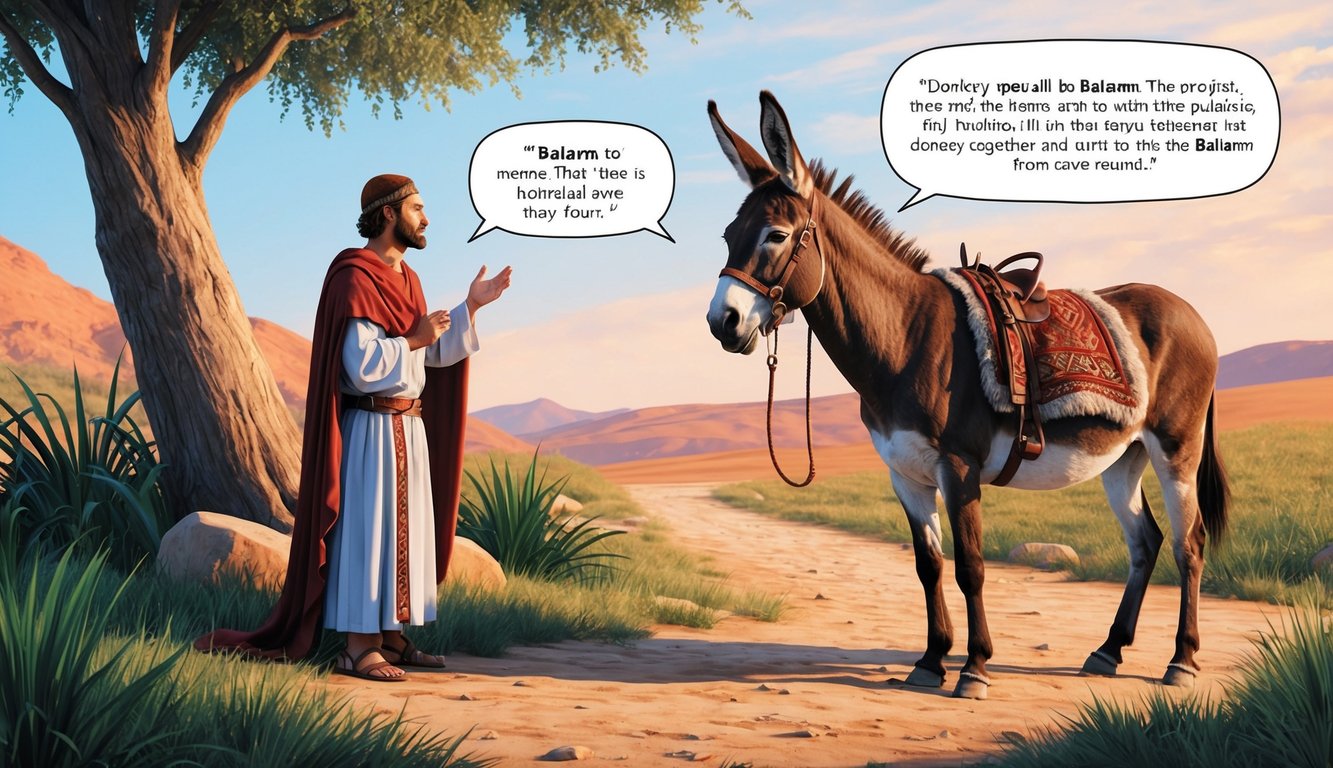Don’t Miss Out On This Unique Astrological Opportunity
Are you tired of spinning your wheels and getting nowhere? Simply put, you’re out of sync: you’re out of alignment with your astral configuration.
But: there’s a kind of map that can help you reclaim your alignment. Think of it as your own personal blueprint to success and happiness: a blueprint that will help you live your most amazing life.
Get started here.
When you dive into the Bible, you might come across the intriguing story of Balaam, a complex figure who appears in the Book of Numbers. Balaam is a prophet from the Bible who is known for his interactions with God and the people of Israel. He is often remembered for being summoned by Balak, the king of Moab, to curse Israel as they traveled through the region.
This request led to a series of dramatic encounters and revelations that underscore the power and will of God.
As you explore Balaam’s narrative, you’ll discover a story rich with lessons about prophecy and divine authority.
Balaam’s tale takes a fascinating turn when he is warned by a talking donkey, a moment that highlights the unexpected ways in which God communicates.
The narrative challenges readers to consider themes of obedience and the complexities of serving multiple masters.
Balaam’s story is a unique blend of prophetic insights and moral challenges.
The diverse portrayals of Balaam in various parts of the Bible offer a window into the changing views of prophecy and its role in the lives of believers.
This compelling narrative not only has historical significance but also continues to provide valuable insights for those who delve into the Scriptures.
Historical Context
Balaam is a figure mentioned in the Bible known for his interactions with the Israelites, particularly in relation to King Balak of Moab.
His story is intertwined with the political dynamics of ancient Moab and Midian.
Balaam’s Lineage and Background
Balaam, a prophet, hailed from Pethor, a town near the Euphrates River in Mesopotamia.
His father was Beor.
This region was known for its spiritual and cultural significance.
Balaam’s reputation as a seer or prophet was widespread, reaching the ears of distant leaders like the King of Moab.
Despite not being an Israelite, he played a key role in biblical events, appearing in several narratives, including [Numbers] and Deuteronomy.
His connection to Mesopotamia highlights his non-Israelite origins, yet he was drawn into the Israelite narrative through his prophecies.
This cross-regional identity adds complexity to his story, influencing how he was perceived by Hebrews and other ancient groups.
The Political Climate of Moab and Midian
During Balaam’s time, the Moabites and Midianites were significant players in the region’s politics.
The King of Moab, fearing the Israelites due to their Exodus from Egypt, sought Balaam’s help to curse the Israelites.
This underscores the tense relations between these neighboring groups.
The Plains of Moab were an important area where these interactions unfolded.
Moabite and Midianite territories bordered regions where Israelites wandered.
The political situation was tense as the Israelites encroached upon these lands.
King Balak hoped to use Balaam’s influence to change his political fortunes.
This highlights the way spiritual and political concerns were intertwined in decisions among these ancient societies.
The Story of Balaam in Numbers 22-24
In the Bible, Balaam is a complex character involved in a tale full of divine intervention and unusual events.
The story includes a talking donkey, direct communication with God, and prophetic messages.
Balaam’s First Encounter With God
In Numbers 22, Balaam is summoned by King Balak to curse the Israelites, who were threatening his land.
Balak sends messengers to persuade Balaam to travel to Moab and fulfill this request.
Balaam, however, seeks guidance from God on this matter.
God tells Balaam not to go with the messengers and not to curse the Israelites because they are blessed.
This is the beginning of Balaam’s journey.
God’s instructions govern his decisions, displaying the struggle between human desires and divine will.
Balaam’s decision not to act without God’s consent sets a precedent for the events that follow.
The Speaking Donkey
Balaam eventually decides to go with Balak’s messengers, but God is angered by this decision.
As Balaam rides his donkey toward Moab, the Angel of the Lord blocks their path.
Balaam’s donkey sees the angel and turns off the road, pressing Balaam’s leg against a wall.
When Balaam strikes it, the donkey miraculously speaks, questioning why it was hit.
This event showcases the donkey’s unique role as a conduit for divine messages.
The speaking donkey episode highlights Balaam’s spiritual blindness.
While he supposedly communicates with God, it is his donkey that perceives the divine presence, underlining the irony and complexity of Balaam’s character.
The Angel of the Lord
In a striking moment, the Angel of the Lord becomes visible to Balaam, standing in the path with a drawn sword.
The angel tells Balaam that his path is considered reckless.
At this point, Balaam finally understands that he must speak only what God instructs.
Here, the angel acts as a protector of divine will, ensuring that Balaam realizes the seriousness of his mission.
This encounter emphasizes the power and authority of divine messengers in biblical narratives.
Balaam learns that his role is to bless rather than curse, forwarding God’s message instead of King Balak’s desires.
Balaam’s Influence and Legacy

Balaam is a significant figure with a complex role in biblical narratives.
His oracles had a considerable impact on Israel and Moab.
The New Testament offers a unique perspective on his actions, and both Jewish and Christian traditions provide varied interpretations of his legacy.
Balaam’s Oracles and Their Impact
Balaam is known for his oracles, which played a crucial role in shaping the biblical story.
Despite being summoned by Balak, the Moabite king, to curse Israel, Balaam’s prophecies resulted in blessings instead.
This unexpected outcome intensified tensions between Moab and Israel.
His oracles, focused on Israel’s destiny, reiterated themes of divine protection and promise.
His reputation as a wicked prophet was solidified by the outcome at Peor, where he advised leading Israel into sin.
This advice led to catastrophic events for Israel, as his role as both a seer and advisor highlighted the complex interplay of curse and blessing in his influence.
The New Testament Perspective
In the New Testament, Balaam is cited as a negative example in several books.
The apostle Peter refers to him in his warnings against false prophets.
Balaam’s name becomes synonymous with the dangers of greed and leading others astray.
Jude also mentions Balaam when discussing sinful behaviors and the path of destruction.
In Revelation, the church at Pergamum is warned against the teaching of Balaam.
Here, his influence is associated with sin and idolatry.
This new perspective reinforces Balaam’s image as a false prophet, illustrating the continuing significance of his story in Christian teachings.
Jewish and Christian Interpretations
Balaam’s story is interpreted in various ways within Judaism and Christianity.
In Jewish tradition, his role as a prophet outside Israel reflects the complexity of divine interaction with the nations.
Some Jewish texts portray Balaam as a failed sorcerer who ultimately submitted to God’s will.
In Christianity, Balaam’s legacy is often linked with the concept of the Messiah.
Some see him as a figure who foreshadowed the Magi, connecting him to those who recognized Jesus.
While Balaam is remembered for his role in contentious actions, his story provides rich material for exploring prophetic themes in both traditions.
Theological Themes in the Balaam Narrative
In the story of Balaam in the Bible, you can find rich theological themes.
Central ideas include God’s sovereignty, human free will, and how prophecy works.
These themes shape Balaam’s story and highlight key aspects of the relationship between God and humans.
The Sovereignty of God
Throughout the Balaam narrative, God’s sovereignty is clearly emphasized.
Despite Balaam’s role as a soothsayer or diviner, it’s God who controls the events.
Balaam is hired by Balak to curse Israel, but God intervenes. Yahweh insists that only blessings can be spoken over Israel.
This shows that no matter the intentions of humans, God’s purpose prevails.
This divine control highlights how God’s plans cannot be swayed by divination, magic, or any so-called idols.
He holds ultimate authority, showing His love and commitment to His chosen people by not allowing a curse to touch them, showcasing His protective nature.
The Complexity of Human Free Will
Balaam’s story also digs into human free will.
Balaam is willing to follow his own desires and the promise of reward from Balak.
However, he is confronted by God’s power and, in the end, must speak what God commands.
The interplay between Balaam’s wishes and God’s will underline the complexity of free will.
Even though Balaam is a skilled diviner and aims to use his talents, he learns that true power rests in God’s hands.
Thus, human plans are secondary to God’s designs.
This tension demonstrates how God can work through human actions, directing them to fulfill divine purposes even if it might initially seem otherwise.
Prophecy and Divination
Prophecy and divination are core elements in Balaam’s story.
Balaam is initially seen as a diviner and talented soothsayer.
Yet, it’s unmistakably God’s voice that he conveys.
Prophecy in this narrative emerges not from human ability but from the Spirit of God.
The vision of the Star and Scepter emphasizes this divine control, becoming symbols of future hope and leadership for Israel.
These prophetic images go beyond mere divination or magic, pointing to a deeper, spiritual truth orchestrated by God.
This underscores the divine nature of prophecy, where true messages come from God rather than human manipulation or idolatry.
Lessons from Balaam’s Story

Balaam’s story offers important insights into the dangers of greed and the necessity of integrity in leadership.
These lessons are still relevant today, especially when considering moral decision-making and ethical guidance.
The Dangers of Greed and Corruption
Balaam’s story highlights how greed can corrupt even those with divine knowledge.
In the biblical narrative, Balaam, a non-Israelite prophet, is tempted by the promise of riches offered by Balak, the king of Moab.
Balak wants Balaam to curse the Israelites, aiming to weaken them.
Balaam’s wavering heart shows how greed can lead to moral corruption or a “stumbling block” for someone expected to be righteous.
This greed becomes known as the “wages of wickedness.” By being enticed by wealth, Balaam fails to understand the sacred duty of prophecy.
The story warns you about how easily one can lose sight of integrity when faced with temptations.
Balaam’s eventual downfall serves as a cautionary tale against valuing material wealth over moral righteousness.
Integrity in Leadership and Guidance
Balaam’s actions stress the importance of maintaining integrity in leadership roles.
As a prophet, he is expected to serve as a moral guide.
However, he entertains the idea of misleading the Israelites.
This story serves as a reminder that true leaders must prioritize their communities’ well-being over personal gain.
His story highlights the dangers of compromising ethical standards for selfish motives.
This raises important discussions in modern religious leadership, such as the ongoing debate over can women be pastors and the responsibilities that come with spiritual authority.
Upholding integrity ensures that leaders, regardless of gender, serve their communities with honesty and dedication.
Despite having the knowledge of God’s will, Balaam’s indecision and weakness make him a “false teacher.” This illustrates how leaders should avoid being swayed by external pressures.
The story also reflects on idolatry and other transgressions, like sexual immorality, with food sacrificed to idols.
Balaam’s lack of integrity ultimately leads to his downfall, emphasizing that real guidance requires steadfast morals and ethics.



